1. Results compared to the application and centre plan
1.1 How does the vision of the centre, the work packages/ focus areas and activities fit together?
The Centre on Experiential Legal Learning (CELL), Faculty of Law, University of Oslo, aims to extend practice-oriented legal education in a digital age throughout Norway.[1] Through the CELL model of experiential learning and deep student participation, we seek as a SFU to: (1) enhance the quality of learning processes; (2) provide relevant skills to future lawyers; (3) facilitate student research and societal contributions; and (4) improve the student learning environment by moving from a performance to learning culture. The latter includes reducing grade pressure/stress, a competitive student culture, exam retakes and dropout rates, and distance between different study programmes.[2] In so doing, CELL aims to create the Future Lawyer: Graduates ready to manage and work together on new technological, ethical, and social challenges.
As from 2021, CELL included a fifth and long-term goal: development of a culture for pedagogical reflection and development and amongst staff, a community of practice.
Table 1. SFU Work packages and projects
| WP1. Skills ladder |
WP2. Digitalisation & Innovation |
WP3. Practice & Skills |
WP4. Legal pedagogy |
WP5. Communication & Broader Impact |
|---|---|---|---|---|
| 1.1 Planning and evaluation | 2.1 Online education |
3.1 Writing Lab |
4.1 Evaluation & Learning Analytics | 5.1 CELL Norway |
| 1.2 Implementation | 2.2 Digital Courtroom | 3.2 Clinical initiatives | 4.2 Pedagogical research | 5.2 Criminology and Sociology of Law pedagogical development |
| 1.3 Student as researcher | 2.3 LILO - Innovation Lab | 3.3 Centre for mooting | 4.3 Competence building | 5.3 International programmes |
| 1.4 Student as communicator | 2.4 Legislation Lab | 3.4 Forum for dispute resolution | 4.4 Learning assistants | 5.4 Communication |
| 4.5 Learning environment | ||||
| Goals 1, 2, 4 | Goals 2, 3 | Goals 2, 3 | Goals 1, 4 | Goals 1-4 |
As a Centre for Excellence in Education (SFU), CELL seeks to realise these goals through four core work packages: (1) implementing a skills ladder plan over the 5-year Master in Law through integration of experiential learning, especially in assessment; (2) developing online education and legal innovation; (3) strengthening students’ skills and practice opportunities through specific initiatives; and (4) developing legal pedagogy. While dissemination is built into the design of many of these activities, a fifth work package includes establishment of CELL Norway with the law faculties in Bergen and Tromsø, and pedagogical development at the faculty’s criminology/sociology of law and international programmes. CELL strives to be a European hub for experiential legal education and creating a ‘living model’ of an integrated experiential curriculum.
The relevant projects for each work package are set out in Table 1. The relationship between the work packages and goals is detailed at the bottom of the table. Each project is relatively independent in its goals and organisation but there are significant synergies between them. Institutionally, the projects can be also classified as following: systemic development in cooperation with the faculty (WPs 1, 4), experimental development with labs and specific initiatives (WPs 2–3); and research and dissemination (WPs 4.1/4.2, 5).
The structure and activities of CELL are designed to support the implementation of these work packages. It is based on a staff-student partnership and a vision of students as co-producers of their education and future. The organisation is led by a leadership team – with a director, student co-director,[3] deputy director, centre manager, project coordinator and pedagogical advisor. It is assisted by a coordination team, which – after the 2021 organisational reform – is constituted by all academic and student project leaders, and others with considerable responsibility.[5] By 2022, a total of 57 individuals work at CELL (employed or bought out), although most in a part-time capacity. CELL’s leadership reports to the faculty leadership and the CELL Board on overall strategic direction. CELL has been further guided by its International Advisory Board and regular meetings with the Student Law Society and other student organisations.
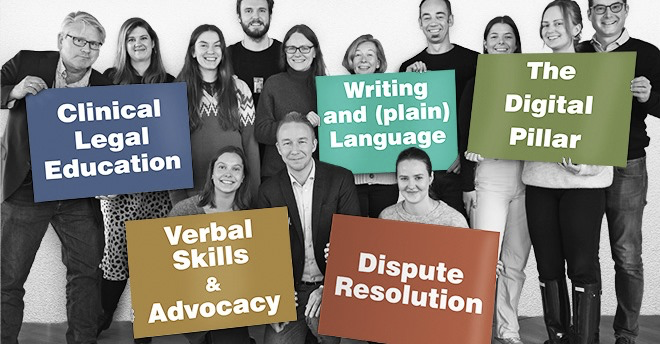
During 2020 and 2021, three important changes occurred in CELL’s working model. First, the tripartite model of faculty teachers, students, and administrative staff working together on an equal basis was expanded to a ‘quadripartite’ model, with a pedagocial education or background in each project acitvity. Second, the organisation moved formally in 2021 from an organisation based on seminal pillars to SFU projects (see Table 1/Figure 1). This was to better align activity with structure, facilitate interdisciplinary work, and create a more sustainable workload for academic staff. Third, CELL participated in several successful research and education funding applications, as both partner and leader. Furthermore, CELL staff have been asked to play specific roles in national/university initiatives. This has enhanced or expanded the nature of some SFU projects. In 2022, to ensure a sustainable pace of change, a further iteration occured with a prioritsation of projects. In 2022, the skills lader, writing lab, and research were given highest priotiy.
1.2 Accomplishments and activities, expected results and impact, and goal contributions
The level of activity at CELL has been relatively high with several key accomplishments. While the pandemic led to the postponement of several important activities, the key challenge has been ensuring that the organization has the capacity to match all its goals and support intensive transformational work.
The activities and impact for each WP is listed and discussed in separate sub-sections below with a focus on 2022; and the timetable and concrete progress for implementation is set out in Espresso. Some of the highlights of CELL’s first 31 months as an SFU include:
- Online education: Embedding our local and national work on online education in the centre and faculty. As an SFU, this has included hosting 9 webinars, presenting at 21 conferences/workshops, co-facilitating a faculty strategy on online education, initiating frontrunner groups on home exams and flipped classroom, and engaging in regular media communication to influence sectoral policy.
- Skills ladder: Developing, piloting, and refining concrete plans with course coordinators for five new experiential modules/courses, and releasing and flollowing-up a series the reports on reforming learning outcomes and creating a process for the implementation of the skills ladder.
- Students as researchers: Making significant advances in the student as reserachers project with a highly developed skills ladder plan, piloting student research projects and reformed course design, and facilitating nation-wide student communication (including a documentary with NRK).
- Evaluation and research: Releasing 8 evaluation reports (with over 3500 student responses), piloting a new central evaluation system, publishing our first academic article, conducting a survey review of experiential legal education literature, employing two Ph.D. fellows, and gaining national/university recognition for learning analytics expertise.
- Digitalisation and innovation: Establishing an innovation lab, developing a protype for the digital courtroom, expanding the LovLab legislation clinic, and supporting law students to secure and use innovation funding.
- Scaling up practice: Launching several practice initiatives, including facilitating a practice course for criminology students, and obtaining funding from the RCN for a new student clinic on ID rights.
- Competence building and learning assistants: Developing a regular course for new staff on pedagogical competence in law; providing online pedagogical resources for student writing assistants, coordinating the selection of over 200 writing/teaching assistants, improving the quality of 1st semester student colloquia, and expanding colloquia support to other semesters.
- CELL Norway: Establishing CELL Norway and developing a joint proposal on elective subject coordination, holding two joint courses with University of Bergen, and assisting UiB with its successful application for HK-dir funding.
- Student partnership: Facilitating an active student team which has piloted of a new model of co-leadership, developed the organisation, planned/implemented projects, and engaged in broad outreach. CELL students are called upon regularly to present externally.
We have developed CELL as an organization, with a focus on internal policies, management and recruiting. Furthermore, we have also developed an internal and faculty culture for pedagogical innovation and student participation. This has been challenging work, as we tried to find the right fora for collaboration with the faculty and the student law society, develop internal routines and working cultures, manage budgets, and secure physical space.
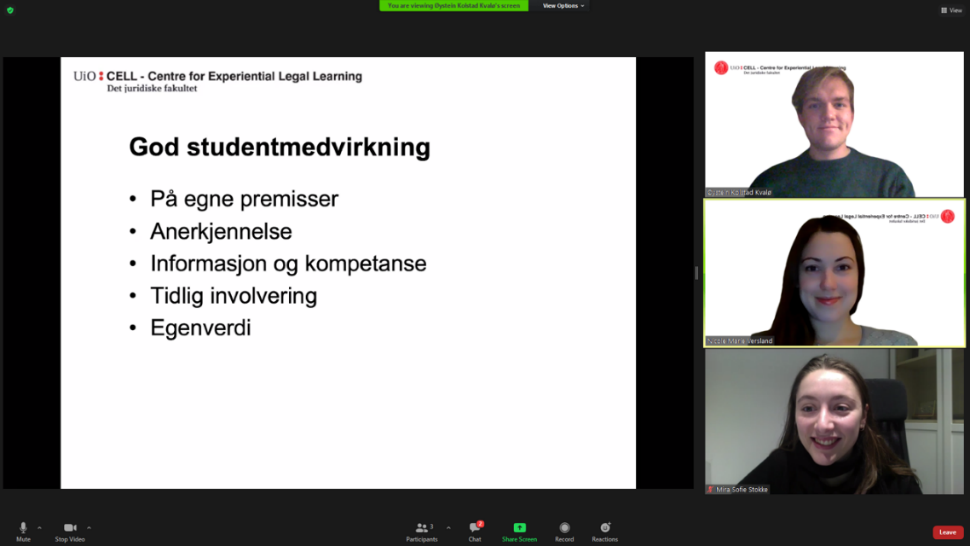
A key plank in CELL’s philosophy and practice is the inclusion of students in educational reform leadership. They co-lead projects, improve contacts with student bodies, participate in strategic/organisational development, and disseminate findings. CELLs Student Co-Director represents the organisation in several forums, including the university's Pedagogical Innovation Network (PIN), which is otherwise constituted by the leaders of SFUs and HK-Dir Active Learning projects. Moreover, they took on the rotating leadership of PIN for one year, up to June 2022. Student project leaders have led parallel sessions at the annual University of Oslo education and SFY conferences and participated in HK-dir's podcast on student partnership.
Student leaders have analysed the CELL model and presented this in different fora. The positives include early inclusion in CELL’s founding, paid positions, a positive culture towards student participation/leadership, and trust in students’ ability to lead, represent and undertake important tasks. Challenges include underlying power asymmetry, greater time commitments of staff, non-election by their student peers, and the more regular changes in student positions.
Moreover, the model of change envisaged by CELL is complex, but potentially transformatory. It envisages both direct change (planned impact) and indirect change (inspiration, cultural change). This multivalent approach is reflected in mechanisms for change, which include incentives (resources, reputation), discourse and dialogue (reshaping the consensus on what is good legal education), and legitimation (involving staff, students, and partners). This provides energy, originality, and acceptance and has a ripple effect as those involved become new ambassadors and agents of change. Finally, with a new fifth goal, the organisation has also begun to reflect on CELL’s endgame – the ultimate development of a community of practice. If academic teachers become more agentic, dialogue-seeking, and oriented towards pedagogical research, then pedagogical centres such as CELL can become less change-driven and more facilitation-focused.
The following provides an overview of activities and accomplishments with a focus in the narrative text on 2022.
Work package 1 – Skills Ladder
| Projects | Activities & Accomplishments | Expected Impact | Relevant Goals |
|---|---|---|---|
| 1.1 Planning and evaluation |
Final report on learning outcomes and assessment (2022) Pedagogical support to elective course reform (2021-2022) |
Lay the basis for Project 1.2. | 1-4 |
| 1.2 Implementation |
Evaluated and reformed group presentation in Legal History (2022) Evaluation and reform of Programming for Lawyers (2022) Approval of a range of new elective subjects with experiential learning (2022)
|
Improve theory learning Improve skills Improve learning environment Decrease dropout rate, competition, and grade pressure |
1-4 |
| 1.3 Student as researcher |
Pilot course in project design and method (2021-2023) Published a report on progressive development of academic skills (2022) Project with SODI ID rights research project and students in all key roles (2021) Piloting of Project Design course before introduction as compulsory course (2022) |
Improve theory learning Improve skills Improve learning environment |
1-3 |
| 1.4 Student as communicator | Launch of pilot student podcast project (2021-2022) with four episodes | Improve range of skills | 2 |
The cornerstone in the SFU plan is the development of a ‘skills ladder’ through the 5-year Master of Laws. Figure 1 contains the original 2019 plan, with compulsory experiential module in each semester to develop four relevant skills and improve learning outcomes and environment. This plan has been updated, with “Advocacy and Negotiation” divided into “Oral and Mooting” and “Dispute Resolution” and the addition of two new ladders on “academic skills” and “cooperation and collaboration skills” (see projects 1.3/4.2).
In April of 2022, Project 1.1 Planning and evaluation of the skills ladder, was
partly completed with the publication of the final draft of the proposal and process reports. The revision of the learning outcomes, based on a skills-based progression will continue in 2023, with new forms of teaching and assessment also being the topic of discussion. Through autumn 2022, the work on a matrix, which contains an overview of desired learning activities through the master’s program, was started. In addition, CELL played a major role in supporting the elective course reform, which prioritised pedagogical criteria and the skills ladder in the selection of 50 elective courses for 2023-2027.
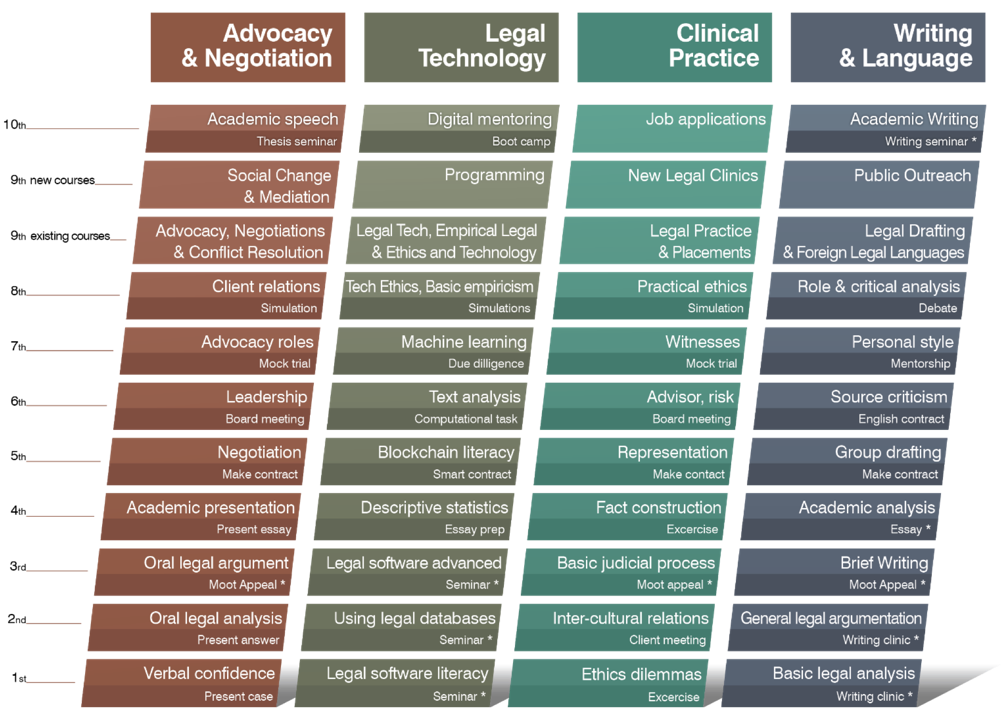
Project 1.2 Implementation of the skills ladder continues in parallel with the development of the formal plan and process. In 2022, we specifically evaluated and reformed the compulsory contract negotiation on 3rd year and programming for lawyers course; and helped course coordinators for Legal History in 3rd year evaluate and reform the permanent group pral presentation; and supported a reform process for the compulsory legal philosophy course.
Click here to watch the CELL Video on the Skills Ladder
Project 1.3 Student as researcher was introduced in 2021 to focus on the development of academic skills. In early 2022, a comprehensive plan for integrating academic skills throughout the entire curriculum, based on Bloom's taxonomy, was finalised. In the autumn of 2022, the project group arranged a pilot course for students writing their master's thesis, with the topic being how to design a master's thesis and choose appropriate method. The first student research pilot was also completed in 2022, with student reports and academic publications on digital theft gaining nation-wide attention and prompting an investigation by the finance ombudsmen.
In Project 1.4 Student as communicator, we investigated the opportunity of having a podcast project with students based on 2021 pilot. CELL also arranged a workshop on oral skills, as an extension of writing lab workshop for the written memorial in the 2nd year compulsory mooting (mock trial) exercise. Late in 2022, CELL was also asked to contribute with students to reform the legal part of the Norwegian Encyclopaedia.
Work package 2 – Digital Learning
| Projects | Activities & Accomplishments | Expected Impact | Relevant Goals |
|---|---|---|---|
| 2.1 Online education |
Supporting hybrid teaching infrastructure and teachers using hybrid teaching (2020-2022) Testing technologies for universal design, especially automation of video texting (2021-2023) Project-leader for introduction of new video software at UiO, for more effective video-development (2022) |
Improve quality of digital education Increase opportunities for interactive learning Decrease pressure on teachers/students |
1, 2, 4 |
| 2.2 Digital courtroom |
Development of a prototype and securing of extra university funds (2021-2022) Pilot digital mock trial in Zoom with ICJ Norway and Maritime Law students (2020) Development of Justbot digital application with Tech-R (taken forward by Tech-R) (2020-2021) Testing automated feedback applications and advertising Ph.D position (2020-2022) Consultancy for Norwegian Court Administration on digital courtrooms in Croatia and follow-up seminar series (2021-2022) Student project for SAKULATOR RCN project with machine learning-based estimation of case length for judges (2022) |
Provide new digital learning tools Create future work tools for law students Increase focus on EdTech and learning analytics within legal education |
2, 3 |
| 2.3 LILO – Innovation Lab |
Survey on digital knowledge and digital skills (2021) LILO Talks on legal technology (2022) Assistance to student groups to make use of innovation funding from research council (2022) Establishment of support routines for student projects (2021-2022) Co-hosting of Meetup series with Lexolve for legal tech community in Norway (2022) Innovation day at Domus Juridica with the TIAGo robot (2022) Responsibility for boot camps in Legal Tech course and Programming for Lawyers course (2022) Planned a panel debate in collaboration with Tech Forum (2022) |
Opportunities for student innovation Support students with innovation Meeting space for students, staff, and partners |
2, 3, 4 |
| 2.4 Lovlab Legislation Clinic |
Three semesters of student-driven law reform reports (2020-2022) Inclusion of non-law and Bergen students (2021-2022) Experimenting with teaching assistants and support to student public outreach (2021-2022) Evaluation and marketing (2020-2022) |
Increase opportunities for clinical practice Allow students to make societal contributions |
2, 3, 4 |
In 2022, the project online education project (2.1) in CELL’s digital learning work focused primarily on sustaining the infrastructure and framework that had given good results during the pandemic. This included good hybrid teaching and use of digital techniques to physical teaching and universal design. The leader for the faculty/CELL video studio was also chosen as the project-leader, co-financed by CELL, for a project at UiO implementing the Panopto video software and system across the university.
The Digital Courtroom Project 2.2 continued with full prototype development and demonstrations. However, in August 2022, this was put on hold as our developer left for data science studies abroad. The work moved into a new planning phase and will continue in 2023 with reconstituted team.
Project 2.3 Legal Innovation Lab in Oslo (LILO) has held a series of public meetings and student consultations. LILO has created a mentoring support structure for student legal tech projects, took over responsibility for the boot camp on legal technology and the Legal Tech Meetups. The "LILO" project also further developed dialogue with the student organisation CF Futurum. For all activities, see table above.
In Project 2.4 Lovlab Legislation Clinic, a course where students write comprehensive law reform reports after mandates given by governmental bodies and private actors were developed. In 2022 it was a distinct CELL project. Marketing and evaluation were prioritised. Interdisciplinarity has also been a strong agenda. Students from the criminology programme and UiB have been included in the course and Lovlab has made significant impact on real legal development.
Work package 3 – Practice and Skills
| Projects | Activities & Accomplishments | Expected Impact | Relevant Goals |
|---|---|---|---|
| 3.1 Writing Lab |
Piloting of writing lab in three compulsory courses, two electives, and criminology courses (2022) Improved recruitment process of student teaching assistants (2021-2022) Planning of full launch in March 2023 (2022) Online learning resources for assistants (2021-2022) Piloted an all-day writing workshop for JUS1211 (2022) Writing workshops for English electives and IKRS |
Improve quality of feedback & learning culture Gradual expansion and quality assurance |
2, 3, 4 |
| 3.2 Practice initiative |
Delivered reports of recruitment sustainability of student clinics, and supported with marketing (2021-2022) Investigated practice places, quality assurance, and competence building together with Insj (2022) |
Increased opportunities for practice
|
2, 3, 4 |
| 3.3 Mooting Initiative (mock appeal trials) |
Started a pilot project for expansion of the JUS5040 Moot Court course and skill development (2022) Established the elective course, JUS5041 Moot Competitions (2022) Delivered a report on integrating mooting in more compulsory and elective courses and supporting student initiatives (2022) Supported participation in four international Moot competitions (2022) Development of plan for research on oral skills (2022) |
Increase opportunities for learning oral and advocacy skills | 2, 4 |
| 3.4 Negotiation Forum |
Sent a team to participate in Bucerius Mediation Competition (2022) Delivered a report on what students who want to participate in similar competition must be aware of (2022) Held to negotiation courses, for students at the faculty (2022) |
Increase opportunities for learning dispute resolution skills Increase quality of existing courses |
2, 4 |
In Project 3.1 Writing Lab, we aim to increase awareness regarding clear, precise and understanable language. At the new writing lab, students are given formative and real-time feedback on actual assignments in many compulsory and elective subjects. The lab was piloted and partially established in 2022 and, by the end of 2022, we are set for the opening of the dedicated room for the Writing Lab, and expansion in number of assignments covered, as well as support for legal writing in New Norwegian.
In Project 3.2 Practice Initiatives, CELL and the Law Faculty has supported Insj's initiative to provide legal information services by students on entrepreneurship law to student entrepreneurs. Extensice student research and dissemination on ID-theft has also occured through the ID-lawyer student clinic launched and coordinated by CELL with Street Lawyer, Jussbuss and JURK.
In Project 3.3 Mooting, work has followed two paths. One includes work on increasing the oral elements in the optional course in the study, in particular the course JUS5040 Moot Court. In August 2022 Project 3.4 Negotiation Forum, CELL employed a new student leader, who created a framework for students to join legal negotiation competitions and in 2022, students participated in their first competitions.
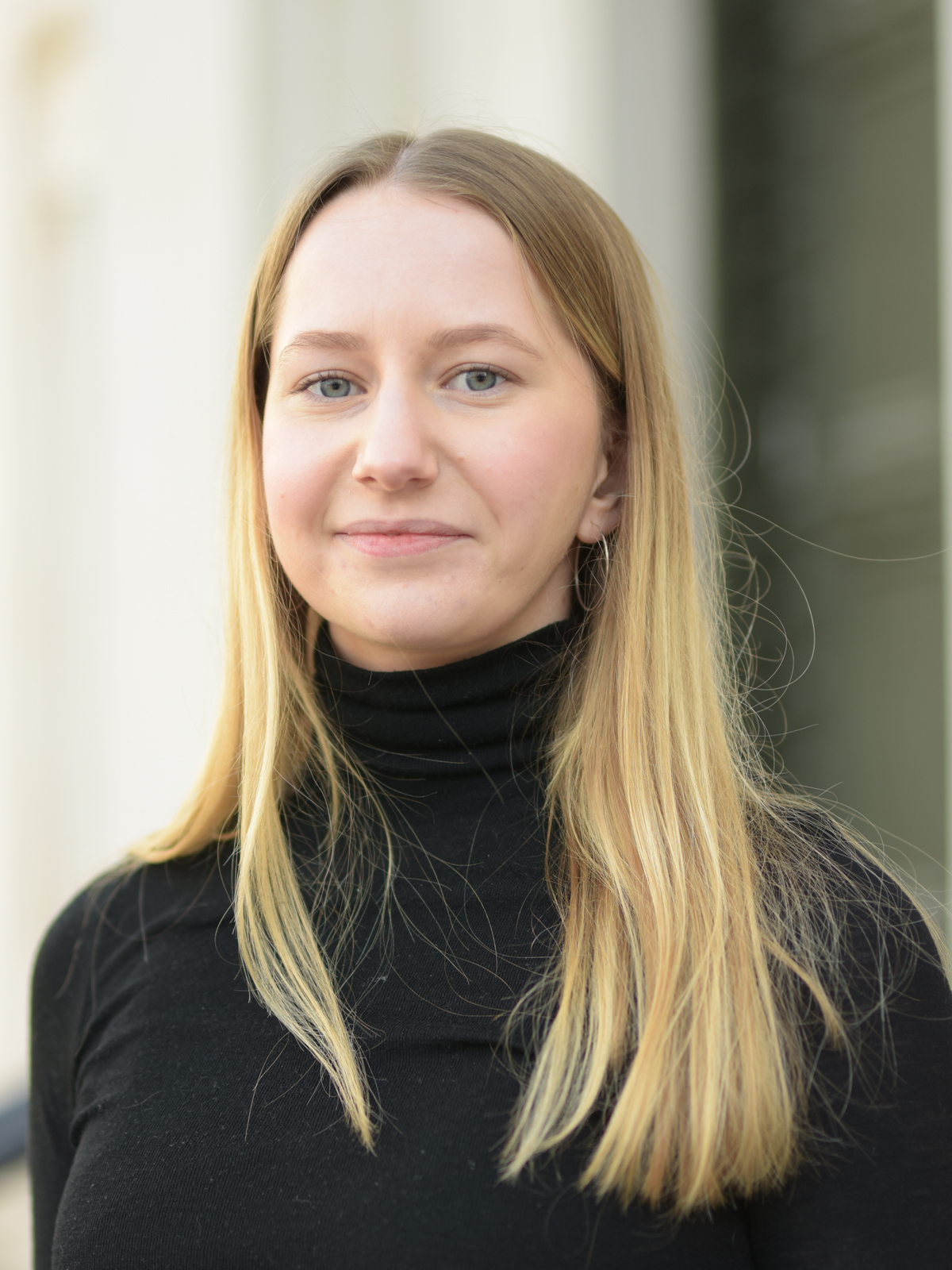
Pictured here: Amelia Ella Svensson (student worker in CELL)
Work package 4 – Legal Pedagogy
| Projects | Accomplishments | Expected Impact | Relevant Goals |
|---|---|---|---|
| 4.1 Evaluation & Learning Analytics |
Seven published evaluation reports (2020-2022) Wide dissemination on home exam reports and semester evaluation reports (2020-2022) Partnership and leadership in HuLAR learning analytics project at University of Oslo (2021-2022) Leadership of University working group on guidelines for learning analytics (2022) Participation as member in national expert group on learning analytics (2021-2022) |
Influence teaching & admin Influence teaching & admin & WP1 Baselines for WP1, 3 and CELL as SFU Influence teaching & admin Develop basis for learning analytics |
1, 2, 4 |
| 4.2 Research |
Drafting of two articles on home exams and
|
Develop research front on online education Develop research front on experiential learning Develop basis for ML algorithms in legal pedtech Influence WP1 and 3.3 - oral skills Influence all WPs through better research Strengthen WPs 1 and 3 with research base + dissemination Develop research front & influence policy |
1, 2, 4 |
| 4.3 Competence building |
Support to experimental elective subjects on good group work (2021-2022) Implementation and evaluation of first pedagogical course for new staff (2022) See also project 2.1 on online education; 3.1 on student writing assistants; and 4.4 on learning assistants |
Pilot competence building on experiential learning Support student leaning cultures Support student leaning cultures, group skills Integrate pedagogy in faculty and ability to reach SFU goals Increase quality of online education Increase quality of writing training |
1, 2, 4 |
| 4.4 Learning Assistants |
Evaluation of colloquia mentors (2022) Coordination of use of emergency COVID-19 funds (1.3 million NOK) at the faculty – focus on colloquia groups post- 1st semester (2020-2022) Piloting of learning assistants in extra electives (2020-2022) |
Support the expanded and better use of student learning assistants | 1, 2, 4 |
| 4.5 Learning Environment |
Participant observation of the 2-day retreat for new Maths and Natural Sciences students (2021) Dialogue with the Student Law Society on concrete steps to reduce competitive pressure (2021-2022) Creation of a working group on learning environment initiatives (2021-2022) |
Implement targeted measures to improve the psycho-social learning environment, especially around grade pressure and competition culture. | 4 |
In Project 4.1 Evaluation and Learning Analytics, CELL contributes to the faculty subject evaluation. The workgroup is led by an academic leader in CELL, assisted by a student project leader, our PHD-candidate, and a member from the administration. In 2022, the group worked on the battery of questions that are distributed to all students. The group invited students to a focus group to make sure they were part of the survey. CELL led the data privacy and learning analytics working group and delivered a report to the university in May 2022, is represented in the leadership group for the University’s Hub for Learning Analytics (HuLAR), and its director is in the National Expert Group on Learning Analytics, which delivered its first report in 2022.
Project 4.2 on pedagogical research expanded rapidly in 2022. Articles on digital courtrooms and anonymisation related to learning analytics were published, and numerous research projects are underway (see table above), two Ph.D. fellows were supported with their initial work. CELL’s Project 4.3 Competence Building developed a 30-hour course in university pedagogy for temporary employees, approved by LINK. This will run for the first time in spring 2023. The project group also started the work on a “database” of good teaching programs. A pilot is developed and completed at JUS1211 in the autumn of 2022.
Project 4.4 Learning Assistants continues its solid work, facilitating the employment of and support of 90-100 learning assistants (LA) each semester. The aim is to support the learning process for students and improve the learning environment. The LA are used as colloquium supervisors, assignment correctors and writing tutors at the writing workshops. Together this impacts approximately 800 students each year. We also have LA for 6 elective courses. In addition, colloquium mentors were employed on funds from Ministry of Knowledge in autumn 2022. CELL hosts the start-up seminar for all LA and maintain the online resources for training on CELL's website.
Project 4.5 Learning Environment aims to meet the students' needs for a better and active learning environment. In 2022, students from CELL held different lectures, an introductory lecture about “Life as a law student” for 1st-year students, approximately 220 students each semester. A closed book exam-oriented seminar in Fall 2022, which intended to help students before their first on campus exam, preceding the pandemic. The attendance was approximately 250 students. A serious of seminars to highlight different paths students can follow after completing their studies. The project is working with the SFU Bioseed Centre director on the survey ‘Sense of belonging’, to get a clearer picture of difficulties students from nonacademic background may feel starting at the faculty.
Work package 5 Management and Communication
| Projects | Activities and Accomplishments | Expected Impact | Relevant Goals |
|---|---|---|---|
| 5.1 CELL Norway |
First physical meeting with Oslo, Bergen &
Plan for cooperation on elective subjects (2021) and implementation of strategy (2022) |
Disseminate results Mutual learning Jointly improve education |
1, 2, 3, 4 (indirect) |
|
5.2 Criminology and Sociology of Law |
Developed a writing workshop for English
|
Provide criminology students with practice Improve range of skills |
2, 3, 4 |
| 5.3 International programmes pedagogical development |
Developed HUMR4504 based on student group
|
Improve theory learning Improve range of skills Improve learning environment |
1, 2, 3, 4 (initial focus on 1, 2, 4) |
| 5.4 Communication | See section 2 below | 1, 2, 3, 4 |
In Project 5.1 CELL Norway, a meeting in April CELL Norway established the project
group as a forum for the exchange of experience and planning between the faculties. During the spring a model for joint elective subject collaboration was developed, with an initial focus on the Oslo and Bergen law faculties. In 2022, the three institutions together held a webinar on ‘How to improve the study quality through student participation’. The CELL Norway leadership structure was also reformed with the education dean from each faculty being replaced by two experientially-focused educators, who have also been contracted as adjunct professors. CELL formalized positions for both Kristine Korsnes (University of Tromsø) and Jan-Ove Færstad (University of Bergen). The formalities on how to further finance and structure the work will be discussed in 2023.
Project 5.2 Criminology and sociology of law programme – pedagogical development strengthened with an additional education fellow and CELL helped facilitate more interdisciplinary cooperation in the teaching between the legal master's program and the study programmes at IKRS, including in concrete courses. The project group also took steps in ensuring greater worklife relevance of the department’s master’s programmes, including the integration of a new practice course pioneered by CELL with the Department.
Project 5.3 International programmes – pedagogical development employed a student leader for pedagogical development of the international master programs at the faculty. The work focused on improving the practice and methodological elements of the human rights master's program and learning from the Skill ladder developed in CELLs project 1.1. In 2023, CELL will need to better coordinate activities and projects between the four international master programs at the faculty, making sure each learns from its activities on integrating active and experiential learning.
Project 5.4 Communication started an article series ‘Law and learning’, about teaching and learning at the Faculty of Law. In it, CELL recognizes teachers and others who have developed innovative approaches, often experiential, to teaching and pedagogy and spread good examples of teaching and learning. The communication project worked systematically through 2022 on digital communication, including improving the website and obtaining an Instagram profile, to better reach out to the students, and make sure that we have established good communication with the faculty administration, the study dean and the teachers. In Spring 2023, CELL will continue to focus primarily on internal communication, but increasingly intensify its work on external communication from Fall 2023.
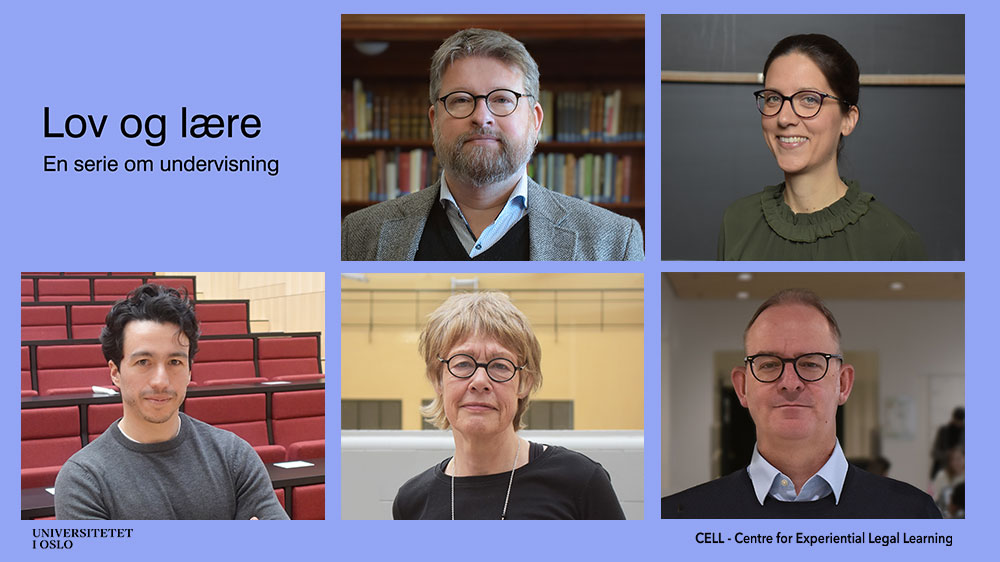
2. Dissemination of knowledge and practices
How has the centre worked with dissemination of knowledge and practices both within and outside of the institution? What is the expected impact of the dissemination activities?
CELL still seeks to establish itself as a pedagogical hub for legal education in Norway and Europe, collaborate with leading pedagogical scholars and experiential legal educators around the world, and provide ultimately a ‘living model’ of experiential legal learning that can be a reference point for reforms elsewhere. As said last year, dissemination is integrated in almost every work package, such that it is part of project plans and organizational structure. In addition, we have a communication project that seeks to assist these effects.
CELL continues to engage with a range of other academic communities. In 2022, the Faculty of Humanities started a development project on a skills ladder at its faculty modeled after CELL's skills ladder. CELL has developed closer integration with the faculties of education and natural sciences with joint appointment of staff to work on collaborative research and development projects. CELL staff are regularly invited to give presentations at other educational institutions, which in 2022 included the Faculty of Social Science, University of Oslo (learning analytics), Department of Literature and Area Studies (educational reform), Department of History, Archaeology and Conservation (SFU experience, experiential learning) and Norwegian Defence University College/Norwegian Military Academy (simulations, SFU experience).
We have sought to continue to contribute to national and local debates on higher education (see media overview) and have submitted several submissions to the Norwegian parliament and Department of Education. In 2022, this included ‘Høringssvar til representantforslag om å styrke undervisningskvaliteten for studenter under pandemien og følge opp studenters studieprogresjon og undervisningstilbud’, Stortinget.no, 16. mars 2022 and ‘Høringssvar – endringer i UH-loven, utsatt ikrafttredelse av krav om to sensorer’, jus.uio.no, 27. april 2022.
The dissemination plan presented to the SFU interview committee and included in the centre plan is set out below, and we report on results. It has been updated for new avenues for dissemination (those with a star *).
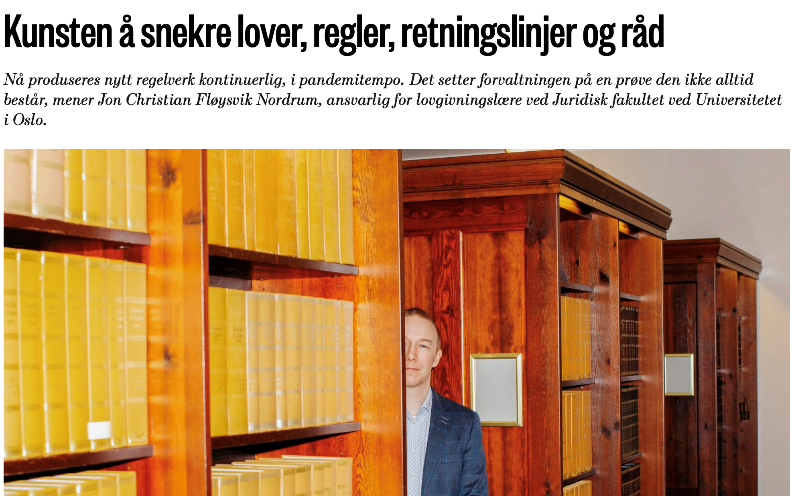
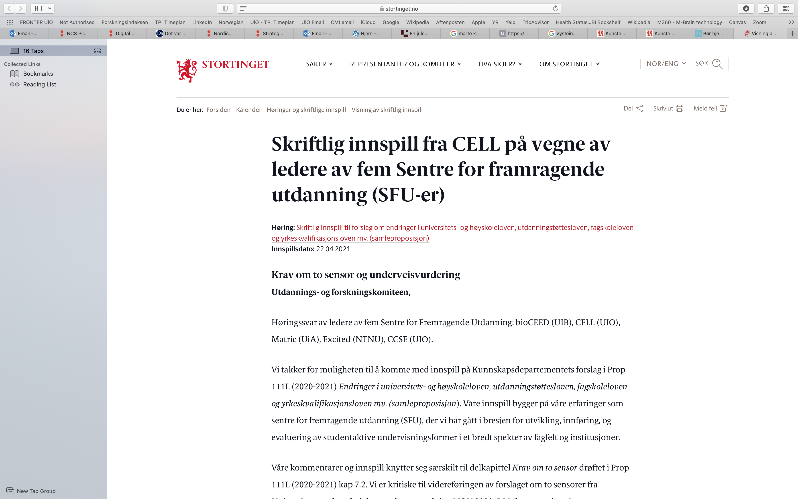
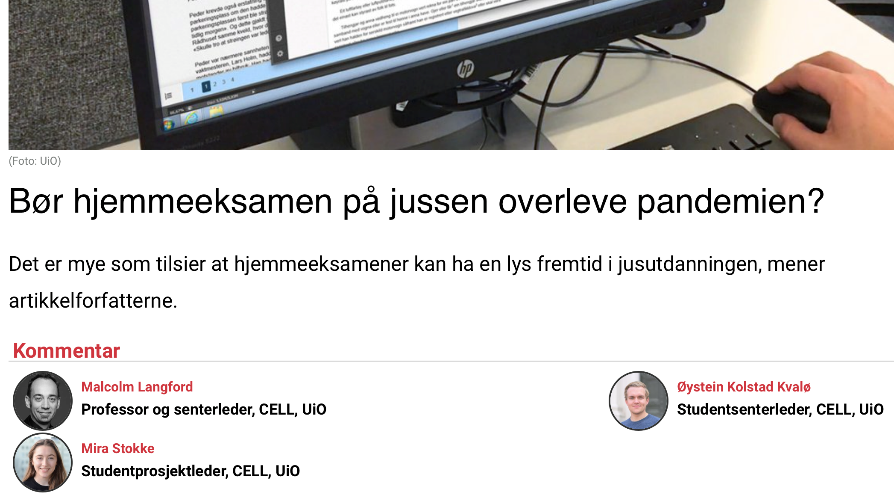
Dissemination plan and Implementation
| Dissem Activity | Plan |
Results in 2020, 2021 |
|---|---|---|
| I. Organisational design | ||
| 1. Centre leadership | Leadership includes all key institutes and programmes | Plan fulfilled. |
| 2. CELL Norway (also project 5.1) | National platform for coordination on experiential legal learning/pedagogical research | See project 5.1 above. |
| 3. Nordic Network | Biannual meeting timed with Nordic Deans + virtual network |
To be further implemented Webinar held with Orebro university in Sweden. |
| 4. European consortium on legal clinics | Through Jussbuss, CELL will disseminate work in this newly established network. | To be implemented |
| 5. International Advisory Board |
Use the board actively as ambassadors for dissemination |
Established and meetings held in Autumn 2020 and 2021. Led to some changes. |
| 6. Academy of Higher Education | To be founded with support from Academy of Science. Initial invited members: SFU leaders/‘merited’ teachers |
To be investigated from Autumn 2023 Proposal made to HK-dir to establish this as an SFU legacy project |
| II. Activities | ||
| 7. Annual Prizes | Annual international and Norwegian prize for CELL. | To be established in 2023 after a review |
| 8. Annual workshops, digital seminars | Assemble teachers, students, key actors, advisory board, leading educators | See activities in project 2.1 and 4.3. |
| 9. Doctoral research on legal education | Monograph/articles that examine the method and effect of activities | Two positions filled |
| 10. Teacher exchange programme | 1-2 week teaching visits by lecturers and student assistants to listen or help | To be implemented from 2024 |
| 11. CELL alumni initiative | CELL students and others in continuous legal education for lawyers | To be implemented |
| III. Dissemination tools | ||
| 12a. Website (and blogs*) | Publicity and documentation of activities and results |
New SFU website launched Development of student pages Write well series |
| 12b. Internal faculty and members* | Development of internal newsletters and engagement in spaces with academic teachers |
Regular newsletter Active participation in general and teacher group meetings (micro dissemination) |
| 12c. Invited presentations* | Present results to conferences and teacher seminars after invitation | Over 30 presentations on CELL’s work, online education, and student partnership |
| 13a. Mass media* | Use of national and university media to communicate | Over 40 interviews and Op. Eds as SFU in 2020-2022; Over 70 as CELL. |
| 13b. Social media | Active use of Facebook/Instagram for CELL and Twitter for prizes. |
Growing use of Facebook and LinkedIn Fortnightly/monthly newsletters Manage national Facebook group on digital education – a digital community of practice but more passive in 2021 |
| 14. Legal education blog | Create an experiential legal learning blog with int’l partners | Under development |
| 15. Academic publishing | The first book on experiential legal learning plus evaluation articles |
First article published Other articles underway |
| 16. Legal Design & Entrepreneur Clinic | Participation of diverse students in design and implementation | Now projects 2.3 and 2.4. |
3. Further progress: What are the expectations for the coming year?
Considering the activities of 2022, is there a need for adjustments of the centre plan, the budget and/or the dissemination strategy?
The 2021 report indicated that the major change for 2022 would be a stronger prioritization of projects in terms of tempo, with a focus in 2022 on:
• WP1 Skills ladder
• WP3.1 Writing Lab
• WP4.2 Pedagogical Research
Going in to 2023, we still see the importance of making some projects more relevant than others, and a need to keep the faculty onboard with all intended activities and changes to which the centre contributes. We see that the faculty partly struggles to adapt to our level of activity, however we have an ongoing dialogue with the faculty, study dean and the study administration, where we will meet monthly to discuss progress. In 2023, the projects that will be most prioritized are: WP1 Skills ladder, WP3.1 Writing Lab, WP3.3 Mooting, WP5.2 Research, and WP5.4 Communication.
[1] CELL was created in June 2018 and formally launched by staff and students in November 2018 with the mission of ‘expanding, experimenting with, evaluating and disseminating new forms of experiential learning in law’.
[2] These learning environment-related goals were elevated from secondary goals to an overall fourth primary goal in 2020. It was recognised that learning environment was not only important for learning but was importnt in itself.
[3] A formal process for its inclusion as a goal has begun.
[4] The position moved from a 40 % position in 2020 to a 100 % position in 2021.
[5] The coordination team was originally the five academic and five student pillar leaders.
.jpg)